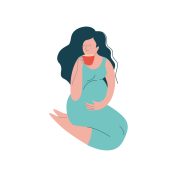Congratulations on your positive pregnancy test! Finally seeing those two precious lines on the pregnancy stick is such a magical time, but once the new reality sinks in, you may start to feel some anxiety about the whole process and have a lot of questions. Our in-house Naturopathic Doctor, Dr. Haylee Nye, is going to walk you through what to do in the beginning of the first trimester, and get your questions answered so you can have the peace of mind knowing you’re on the right track.
In this blog post you will learn:
- Normal signs and symptoms of the first few weeks of pregnancy
- The first three things you should do when you find out you’re pregnant
- The laboratory testing that is recommended to reduce risk of complications
- The recommended nutritional supplements to enhance baby development from the very beginning
First, the basics:
The most common signs and symptoms of early pregnancy:
- Lack of period (exception – 9% of woman reported very light bleeding during the first 8 weeks of pregnancy)
- Nausea with or without vomiting
- Breast enlargement/tenderness and nipple tenderness
- Increased frequency of urination
- Fatigue
How many weeks pregnant are you?
Health professionals will use “Gestational Age” to date your pregnancy. This is based on day one of your last menstrual period, not the date your ovulated. Example: You have a positive pregnancy test on April 24th. Day one of last menstrual period was March 28th. This means your gestational age is 4 weeks!
First pregnancy ultrasound and choosing an ObGyn or midwife:
Your first ultrasound scan will be between 8 and 14 weeks of pregnancy. This is when you will hear the baby’s heartbeat for the first time! Now is the time to decide on a healthcare provider for prenatal care. You can check your insurance plan to see who is in network, or you may want to work with an out-of-network midwifery or women’s clinic.
The First Three Things To Do After You Get Your Positive Pregnancy Test
1. The first thing to do is evaluate your diet, lifestyle, and exposure risk.
You may have already heard that there are certain foods that are harmful to a growing baby. The most common food to avoid are high mercury fish such as tuna, halibut and snapper. Use this table to help you decide what fish to eat; choose fish that are at least under 1.0 PPM concentration. The Environmental Working Group consumer guide is also a great resource. You will also want to stay away from raw meat and deli meats due to high risk of getting an infection.
Increase your consumption of nutrient-dense vegetables such as cruciferous vegetables like broccoli, Brussel sprouts, and cauliflower. Dark leafy greens are an excellent source of folate and other important vitamins needed to build a healthy embryo.
You may start to feel nauseous right away, or more commonly, it will happen around week 6 of pregnancy. At this time, you may not be able to get much food down. Also, your body is revving up metabolism and using any available glucose. This is a time when having quick, healthy snacks available is very useful. Try to combine minimally processed crackers and breads with high-quality fats and proteins, such as nut butters, organic ghee, coconut, avocado and yogurt. This time should pass, so don’t be too hard on yourself if you feel you can’t eat the way you’d like to.
During the first weeks of pregnancy you may feel extremely tired. Again, your body is hard at work cranking our hormones, dividing cells, and trying to support a growing embryo. This is the time to rest as much as possible, don’t over-schedule yourself, and treat yourself to self-care activities like reading, watching your favorite sitcom or being crafty. Try to keep stress low.
Reduce exposure to chemicals such as perfumes, nail polish, cleaning products etc. These chemicals are endocrine disruptors, meaning they can disrupt your hormones and may potentially increase risk of miscarriage. Keep exposure low as much as possible. If you have a cat, be sure to have someone else clean the litter box throughout your pregnancy. Cat feces can transmit toxoplasmosis, an illness that is known to cause birth defects.
Examine the medications and supplements you are taking. Consult with your doctor right away if you are unsure if the medications are safe to take. Don’t abruptly stop any medications without consulting with your doctor first. It is recommended to stop taking most herbal supplements. I will touch on which nutritional supplements to take below.
2. Schedule an appointment with your doctor for laboratory testing.
I recommend a few specific lab tests: CBC, TSH, Ferritin, and Vitamin D. If you have a history of anemia, hypothyroidism, or vitamin D deficiency, it is especially important to know these lab values in early pregnancy to make any adjustments necessary for optimal first trimester results. A TSH for pregnant women between 2.5 and 4.0 is considered subclinical hypothyroidism and is associated with miscarriage. You may need to start thyroid medication in early pregnancy to help reduce the risk and protect your pregnancy. If you are already on thyroid medication, it is recommended to increase your thyroid dose by 30-50% to keep up with the demands of pregnancy.
Ferritin will tell us how much iron storage you have and if you are heading towards anemia. The baby is going to need a lot of iron to build its own blood supply, so it’s important to know your status in case you need to take more iron then what is in your prenatal. Some women, especially if you have digestive issues, have a hard time absorbing certain types of iron. It’s important to work with your doctor to make sure you are on the right type of iron.
Most women are insufficient in vitamin D, especially if they are not consistently taking a supplement. In the pacific northwest, it is near impossible to get all our vitamin D from food and sun alone. Research shows it is important to have vitamin D levels between 50 and 80 ng/dL to help build a healthy baby. Lab testing in important, because if your vitamin D levels are low, you will need to take much more vitamin D to correct the deficiency them someone with a level around the ideal range. You can read more on the many benefits of vitamin D to baby here.
At this time, your doctor can also recommend any additional labs that may be necessary based on your health history.
3. Incorporate Important Nutritional Supplements under the Advisement of your MD or ND
Prenatal vitamin:
Of course, staying on your prenatal vitamin is a number-one must. Make sure that you are getting methylated folate of at least 800mcg per serving. Look at the serving size on the back of the bottle and make sure you are getting that amount every day.
Choline:
A new vitamin on the block that is very important to pregnancy. The RDA is 450-550mg for pregnancy but research shows benefits at higher intake levels, up to 1000mg. Studies also show that sufficient intake of choline is particularly important if you have an MTHFR or PEMT genetic variant. Most prenatal DO NOT contain choline and you must supplement separately. You can also find choline in runny egg yolks and liver. Typically not enough and supplementation is necessary. Find out more about the importance of choline here .
DHA/EPA Omega-3 Fish Oil:
It is recommended to consume at least 1000mg of DHA/EPA each day. I often recommend up to 2000 mg due to their protective and anti-inflammatory effects. DHA is critical to your baby’s brain development and, because the brain begins developing so early in pregnancy, this is a nutrient that you should start right away and continue taking throughout pregnancy and lactation.
Vitamin D:
Most prenatal vitamins contain at least 400 IU. However, recent research suggests that this is not enough to maintain adequate levels of vitamin D in most people and would definitely not be enough to correct a deficiency. Multiple studies have demonstrated that 4000 IU per day is safe during pregnancy and is also more effective than 400 IU at achieving adequate vitamin D levels in mother and infant at birth.
Calcium and Magnesium:
The recommended daily intake for calcium during preconception and pregnancy is 1000mg. Calcium, along with vitamin D, vitamin K2, and magnesium, are critical nutrients for the formation of your baby’s skeleton during pregnancy. If you are not eating dairy products regularly, you are likely not meeting your calcium requirements and will need to supplement.
Most prenatal vitamins contain some calcium but it may not be enough to get you to your recommended daily intake. If you want to increase your calcium intake from food, you can focus on the following:
- Dairy products
- Sardines
- Canned salmon
- Chia seeds
- Dark leafy greens
In summary
Now you have the tools to get your new pregnancy angst out of the way so you can relax and enjoy the beginning of the rest of your life with a new addition to your growing family.

Author: Dr. Haylee Nye
Haylee Nye, ND, MScN is the naturopathic doctor at Blossom Clinic. She graduated from NUNM and completed a one-year residency focused in women’s health at Today Integrative Health + Wellness in Lake Oswego. After her residency, she completed advanced training in integrative infertility. She has a passion for preventing chronic childhood illness by optimizing health in both partners before they conceive. With extensive time spent researching the most current recommendations, in early 2018 she launched an interactive online fertility platform for couple’s planning or currently trying to conceive. TinyFeet.co is where couples can complete an online health assessment and get immediate recommendation specific to their needs.
To schedule a free 10 minute phone consultation with Dr. Nye at Blossom Clinic, simply head on over here!










